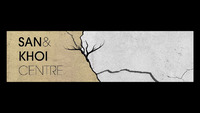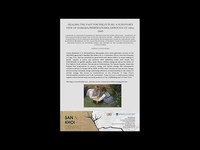-

Reflections by Khadija Heeger: An interview
This interview is a follow up to the book launch of Thicker than Sorrow.
-

Healing the past for the future: A survivor's view of the Damara/Herero/Nama genocide of 1904-1905
A seminar in honour of Women’s Day presented by Dr Yvette Abrahams. Chaired by Dr June Bam Hutchison Director of the San and Khoi Centre. Opened by the Dean of the Humanities Faculty Associate Professor Shose Kessi and closed by Paramount Chief Marthinus Fredericks, of the !Aman Traditional Authority/ Chair of the Khoi and San Kingdom Council of southern Africa and member of the A/Xarra Restorative Justice Forum. Yvette Abrahams is of Damara/Herero descendant and a third-generation survivor of the1904/1905 genocide in Namibia.
-

Dialogue between Yvette Abrahams and June Bam-Hutchison
A dialogue between Yvette Abrahams and June Bam-Hutchison recorded at the event celebrating June's transition from the San & Khoi Centre to the African Gender Institute. A theme during the discussion is the history of the San & Khoi Centre.
-

Indenturedness interrupted: Emancipation from mental slavery: A slavery commemoration event
The San and Khoi Centre hosted a public virtual event commemorating emancipation from slavery in the former Cape colony slave community on 1 December 1838.The seminar presented a unique blend of community and academic perspectives on the theme of identity formation as a consequence of the South African slave heritage. The event was organised and structured to collectively begin to discover new pathways on how we as a society could rethink emancipation, social entanglement and language in South Africa. Speakers tackled the epistemological challenge of unpacking identity development in South African society in a manner that undoes the destructive ongoing divide and rule legacy of colonial power.
-
Two Rivers Urban Park Heritage Project
To create a memory archive reflecting the relationship between the land known as the Two Rivers Urban Park and the indigenous and local communities. This collection within the archive is part of the wider endevours to correct the social narrative distorted by the colonial, apartheid, and capitalist agendas while building a database of orally transmitted knowledge and living memory showcasing the integral relationship between communities which were displaced through these disruptive mechanisms. The Two Rivers Urban Park Project is contextualised within the greater preservation strategy of the confluence area of Liesbeek River and Black River, with its tributary Salt River. The land is the site of active contestation. On the one side is a movement to strengthen its heritage status and on the other side is a development plan by the Liesbeek Leisure Property Trust with the Amazon Development Company as the main tenant on the site.
-

Khoekhoense stamname: ’n Voorlopige verkenning
In this book Professor Nienaber presents his valuable research on Khoikhoi clan names. It is an accompanying text to another publication entitled "Toponymica Hottentitica" which explores the link between clan names and geographical place names. This particular book explores in greater detail the history of the various Khoikhoi clans who have historically made up this community.
-

Reflections by Khadija Heeger: An interview
-

Healing the past for the future: A survivor's view of the Damara/Herero/Nama genocide of 1904-1905
-

Dialogue between Yvette Abrahams and June Bam-Hutchison
-

Indenturedness interrupted: Emancipation from mental slavery: A slavery commemoration event
-
Two Rivers Urban Park Heritage Project
-

Khoekhoense stamname: ’n Voorlopige verkenning



